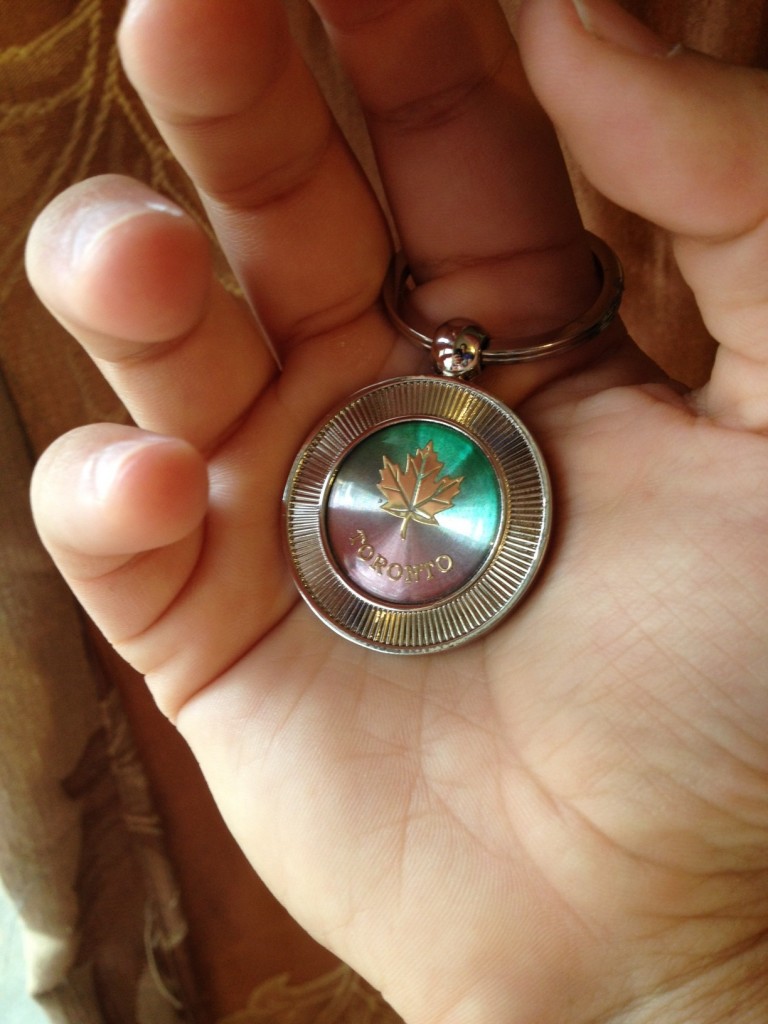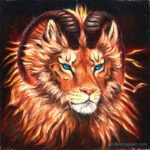 Today is Thanksgiving in the U.S., and I am hiding in my room. Soon I will go and place the massive Death and the Cat print order, but first I want to tell you about something silly that happened.
Today is Thanksgiving in the U.S., and I am hiding in my room. Soon I will go and place the massive Death and the Cat print order, but first I want to tell you about something silly that happened.
Last weekend when I was tidying up my bathroom I came across a bauble I had purchased in Toronto Pearson Airport on my first day in Canada for World Fantasy. At the time I thought nothing of it: I bought it only because all we had were twenties and we needed change to tip our cab. I went into one of those ubiquitous newspaper vendors to see if the cashier could make change for me. English was not her first language, however, (neither was French, before you ask,) and I misunderstood her hand waving to mean I had to purchase something if she were to give me change. So I went over to the stand of cheap souvenirs and selected a simple key ring. It had a maple leaf on it and said TORONTO across the bottom. It was about as generic and impersonal as you could get. But hey, it was $3.99 CAD, which would get me the right amount of change.
When I brought it up to the counter the woman was bemused, and explained (as she rung me up) that her hand waving had meant she was about to get me change, but then I had gone away again!
So I came away with change, and a little generic key ring that I put in my bag and promptly forgot about.
Until last weekend when I found myself in need of a keyring. I turned my bags inside-out and finally found my unnecessary purchase, which had lain forgotten in an inner pocket all through the convention, the flight back to the U.S., the week after staying at my aunt’s house, and finally the drive home.
I picked it up… and was struck at once by the strange certainty that this was a magic object. Take a look for yourself, and see if you don’t agree.

Up until my mid-teens, I was always imbuing ordinary objects with magical attributes. Feathers and stalks of long grass became fantastical animals; my Breyer horses all had names and personalities; and my giant stuffed horse which my grandmother had bought for me when I was three was as much a real person—in my mind—as the people around me.
Side note: I still have this horse. She sleeps in bed with me. This is not for any childish reassurance (though she is more patient about being hugged than my cats are), but because when I was five I saw an animated adaptation of The Velveteen Rabbit, and I promised White Star I would never let that happen to her. So even though we no longer play together, and even though I now have a very real horse to ride, I still keep a special part of my imagination open just for her; where I am forever a child, and she is a real friend. It’s not because I feel I need it—not any more—but because I made a promise. And if you can’t keep the promises you make yourself, what promises can you keep?
Where was I? Oh yes, imbuing ordinary things with magic.
All the best games I played as a kid involved make-believe. Sticks became light-sabers, piles of rocks became castles. The family VW bus became a cursed prison (my mother would argue that this was, in fact, what it was).
I did this with small things too: my favorite earrings were magic talismans; I think I had a pair of boots I pretended were seven-leaguers at one point.
All this imagination didn’t go away as I got older—it just became more directed and focused, and instead of applying it liberally to the real world around me, I channelled it into my art and writing. In fact I’ve channelled it so well I realized—staring down at this cheap trinket that I now knew was in fact a magical object that was merely biding its time until some unforeseen danger threatened, at which point it would shoot it with beams if rainbow light and maple leaves—that I hardly did it any more. I simply don’t have the time or the energy.
Like Matilda, whose powers of telekinesis waned as her brain was allowed to study more interesting subjects, my own powers of creation had been redirected to worlds that only existed on the page. The last time I’d taken the effort of breathing magical life into an ordinary object was when I’d bought Dafydd the little fuzzy red gay dragon at a gift shop in Wales, over a year ago.
So I made a point of dropping the cleaning and, for five or ten minutes, I was an intrepid hero (in my imagination I’m like Aragorn but without the beard or affection for Elvish women) on a quest to escort the mysterious TORONTO medallion through hostile territory. There were many dangers that awaited me, I knew, but the TORONTO medallion (I have decided) is a powerful protective charm, nudging the balance of random actions so things turned out better for the one who holds it.
It is currently employed as the key fob for my spare set of car keys. I figured this would be the best use of its magic: my car is actually a TARDIS and will take care of me. I don’t entirely trust her with other people though, so when my brother takes the spare key to drive her at least he’s got the TORONTO medallion with him.
I think, while it is important to remember that the world of our imagination is just that—a separate world, whose rules do not always apply to our own—it is just as important to keep the mental roads between the two open; that these flights of fantasy are a valuable relief from the real world, and our experiences there can enrich and invigorate us.
This is part of the reason I write fantasy, but it’s also why I will, on occasional, drop everything to go off and play make-believe with a couple stuffed animals and a bauble from an airport souvenir shop.
Sometimes the best magic is the kind we find in the things most ordinary.
~G
Goldeen Ogawa is very careful to make a distinction about the things that are real, and the things that are real only in her head. You can email her about the things in your head at goldeenogawa@gmail.com or peck at her on Twitter @GrimbyTweets.
























